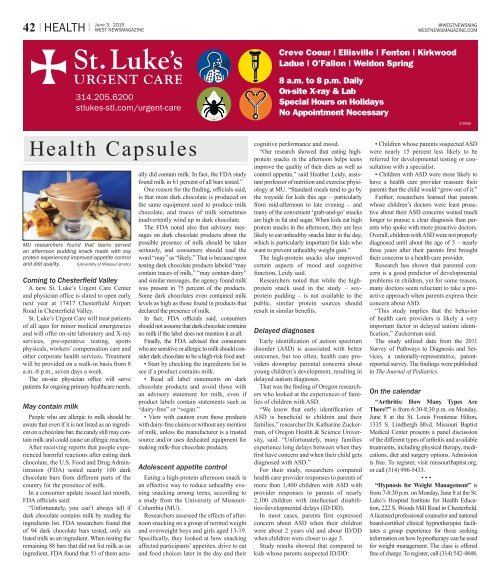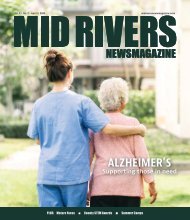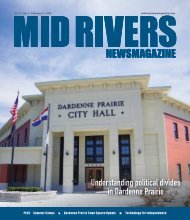West Newsmagazine 6/3/15
news, politics, st. louis county
news, politics, st. louis county
Create successful ePaper yourself
Turn your PDF publications into a flip-book with our unique Google optimized e-Paper software.
42 I HEALTH I<br />
June 3, 20<strong>15</strong><br />
WEST NEWSMAGAZINE<br />
@WESTNEWSMAG<br />
WESTNEWSMAGAZINE.COM<br />
Creve Coeur | Ellisville | Fenton | Kirkwood<br />
Ladue | O’Fallon | Weldon Spring<br />
314.205.6200<br />
stlukes-stl.com/urgent-care<br />
8 a.m. to 8 p.m. Daily<br />
On-site X-ray & Lab<br />
Special Hours on Holidays<br />
No Appointment Necessary<br />
Health Capsules<br />
MU researchers found that teens served<br />
an afternoon pudding snack made with soy<br />
protein experienced improved appetite control<br />
and diet quality. (University of Missouri photo)<br />
Coming to Chesterfield Valley<br />
A new St. Luke’s Urgent Care Center<br />
and physician office is slated to open early<br />
next year at 17417 Chesterfield Airport<br />
Road in Chesterfield Valley.<br />
St. Luke’s Urgent Care will treat patients<br />
of all ages for minor medical emergencies<br />
and will offer on-site laboratory and X-ray<br />
services, pre-operative testing, sports<br />
physicals, workers’ compensation care and<br />
other corporate health services. Treatment<br />
will be provided on a walk-in basis from 8<br />
a.m.-8 p.m., seven days a week.<br />
The on-site physician office will serve<br />
patients for ongoing primary healthcare needs.<br />
May contain milk<br />
People who are allergic to milk should be<br />
aware that even if it is not listed as an ingredient<br />
on a chocolate bar, the candy still may contain<br />
milk and could cause an allergic reaction.<br />
After receiving reports that people experienced<br />
harmful reactions after eating dark<br />
chocolate, the U.S. Food and Drug Administration<br />
(FDA) tested nearly 100 dark<br />
chocolate bars from different parts of the<br />
country for the presence of milk.<br />
In a consumer update issued last month,<br />
FDA officials said:<br />
“Unfortunately, you can’t always tell if<br />
dark chocolate contains milk by reading the<br />
ingredients list. FDA researchers found that<br />
of 94 dark chocolate bars tested, only six<br />
listed milk as an ingredient. When testing the<br />
remaining 88 bars that did not list milk as an<br />
ingredient, FDA found that 51 of them actually<br />
did contain milk. In fact, the FDA study<br />
found milk in 61 percent of all bars tested.”<br />
One reason for the finding, officials said,<br />
is that most dark chocolate is produced on<br />
the same equipment used to produce milk<br />
chocolate, and traces of milk sometimes<br />
inadvertently wind up in dark chocolate.<br />
The FDA noted also that advisory messages<br />
on dark chocolate products about the<br />
possible presence of milk should be taken<br />
seriously, and consumers should read the<br />
word “may” as “likely.” That is because upon<br />
testing dark chocolate products labeled “may<br />
contain traces of milk,” “may contain dairy”<br />
and similar messages, the agency found milk<br />
was present in 75 percent of the products.<br />
Some dark chocolates even contained milk<br />
levels as high as those found in products that<br />
declared the presence of milk.<br />
In fact, FDA officials said, consumers<br />
should not assume that dark chocolate contains<br />
no milk if the label does not mention it at all.<br />
Finally, the FDA advised that consumers<br />
who are sensitive or allergic to milk should consider<br />
dark chocolate to be a high-risk food and:<br />
• Start by checking the ingredients list to<br />
see if a product contains milk.<br />
• Read all label statements on dark<br />
chocolate products and avoid those with<br />
an advisory statement for milk, even if<br />
product labels contain statements such as<br />
“dairy-free” or “vegan.”<br />
• View with caution even those products<br />
with dairy-free claims or without any mention<br />
of milk, unless the manufacturer is a trusted<br />
source and/or uses dedicated equipment for<br />
making milk-free chocolate products.<br />
Adolescent appetite control<br />
Eating a high-protein afternoon snack is<br />
an effective way to reduce unhealthy evening<br />
snacking among teens, according to<br />
a study from the University of Missouri-<br />
Columbia (MU).<br />
Researchers assessed the effects of afternoon<br />
snacking on a group of normal weight<br />
and overweight boys and girls aged 13-19.<br />
Specifically, they looked at how snacking<br />
affected participants’ appetites, drive to eat<br />
and food choices later in the day and their<br />
cognitive performance and mood.<br />
“Our research showed that eating highprotein<br />
snacks in the afternoon helps teens<br />
improve the quality of their diets as well as<br />
control appetite,” said Heather Leidy, assistant<br />
professor of nutrition and exercise physiology<br />
at MU. “Standard meals tend to go by<br />
the wayside for kids this age – particularly<br />
from mid-afternoon to late evening – and<br />
many of the convenient ‘grab-and-go’ snacks<br />
are high in fat and sugar. When kids eat high<br />
protein snacks in the afternoon, they are less<br />
likely to eat unhealthy snacks later in the day,<br />
which is particularly important for kids who<br />
want to prevent unhealthy weight gain.”<br />
The high-protein snacks also improved<br />
certain aspects of mood and cognitive<br />
function, Leidy said.<br />
Researchers noted that while the highprotein<br />
snack used in the study – soyprotein<br />
pudding – is not available to the<br />
public, similar protein sources should<br />
result in similar benefits.<br />
Delayed diagnoses<br />
Early identification of autism spectrum<br />
disorder (ASD) is associated with better<br />
outcomes, but too often, health care providers<br />
downplay parental concerns about<br />
young children’s development, resulting in<br />
delayed autism diagnoses.<br />
That was the finding of Oregon researchers<br />
who looked at the experiences of families<br />
of children with ASD.<br />
“We know that early identification of<br />
ASD is beneficial to children and their<br />
families,” researcher Dr. Katharine Zuckerman,<br />
of Oregon Health & Science University,<br />
said. “Unfortunately, many families<br />
experience long delays between when they<br />
first have concern and when their child gets<br />
diagnosed with ASD.”<br />
For their study, researchers compared<br />
health care provider responses to parents of<br />
more than 1,400 children with ASD with<br />
provider responses to parents of nearly<br />
2,100 children with intellectual disabilities/developmental<br />
delays (ID/DD).<br />
In most cases, parents first expressed<br />
concern about ASD when their children<br />
were about 2 years old and about ID/DD<br />
when children were closer to age 3.<br />
Study results showed that compared to<br />
kids whose parents suspected ID/DD:<br />
3-2665<br />
• Children whose parents suspected ASD<br />
were nearly <strong>15</strong> percent less likely to be<br />
referred for developmental testing or consultation<br />
with a specialist.<br />
• Children with ASD were more likely to<br />
have a health care provider reassure their<br />
parents that the child would “grow out of it.”<br />
Further, researchers learned that parents<br />
whose children’s doctors were least proactive<br />
about their ASD concerns waited much<br />
longer to pursue a clear diagnosis than parents<br />
who spoke with more proactive doctors.<br />
Overall, children with ASD were not properly<br />
diagnosed until about the age of 5 – nearly<br />
three years after their parents first brought<br />
their concerns to a health care provider.<br />
Research has shown that parental concern<br />
is a good predictor of developmental<br />
problems in children, yet for some reason,<br />
many doctors seem reluctant to take a proactive<br />
approach when parents express their<br />
concern about ASD.<br />
“This study implies that the behavior<br />
of health care providers is likely a very<br />
important factor in delayed autism identification,”<br />
Zuckerman said.<br />
The study utilized data from the 2011<br />
Survey of Pathways to Diagnosis and Services,<br />
a nationally-representative, parentreported<br />
survey. The findings were published<br />
in The Journal of Pediatrics.<br />
On the calendar<br />
“Arthritis: How Many Types Are<br />
There?” is from 6:30-8:30 p.m. on Monday,<br />
June 8 at the St. Louis Frontenac Hilton,<br />
1335 S. Lindbergh Blvd. Missouri Baptist<br />
Medical Center presents a panel discussion<br />
of the different types of arthritis and available<br />
treatments, including physical therapy, medications,<br />
diet and surgery options. Admission<br />
is free. To register, visit missouribaptist.org,<br />
or call (314) 996-5433.<br />
• • •<br />
“Hypnosis for Weight Management” is<br />
from 7-8:30 p.m. on Monday, June 8 at the St.<br />
Luke’s Hospital Institute for Health Education,<br />
222 S. Woods Mill Road in Chesterfield.<br />
A licensed professional counselor and national<br />
board-certified clinical hypnotherapist facilitates<br />
a group experience for those seeking<br />
information on how hypnotherapy can be used<br />
for weight management. The class is offered<br />
free of charge. To register, call (314) 542-4848.

















